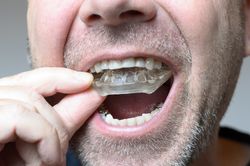
Bruxism is the act of grinding one’s teeth. While it may seem harmless, it can have long-term negative impacts on oral wellness, and it may leave you needing restorative dentistry work done. Below, Webster, NY’s Katz Family Dentistry explains this phenomenon in greater detail.
A Dental Practice’s Guide to Tooth Grinding
What Causes Bruxism?
There are many possible causes for tooth grinding. Often, it occurs at night, unbeknownst to the person doing it. While sleep apnea is one contributing factor linked to bruxism, it is also common in young children. Sometimes, it is a result of underlying stress or anxiety.
Unless someone indicates you’ve been grinding your teeth, it can be difficult to pick up on bruxism. Some warning signs include sore jaw muscles, headaches, and aching gums or teeth upon waking up.
What Are the Risks?
Over time, the constant friction produced by grinding the teeth can cause issues like fractures, gum recession, and erosion of enamel. It can even alter the alignment of the teeth, which could lead to long-term bite issues. To prevent the need for restorative dental work such as implants, root canals, and even dentures, address bruxism as early as possible.
How Can I Treat the Condition?
 Treating bruxism effectively often requires dental patients to address the underlying cause for the condition. In young children, establishing a soothing bedtime routine like reading a book could help alleviate nightly worries. For adults, managing or treating sleep apnea could help to prevent tooth grinding. If there is no identifiable cause for bruxism, however, dentistry solutions such as mouth guards may be implemented to discourage tooth grinding.
Treating bruxism effectively often requires dental patients to address the underlying cause for the condition. In young children, establishing a soothing bedtime routine like reading a book could help alleviate nightly worries. For adults, managing or treating sleep apnea could help to prevent tooth grinding. If there is no identifiable cause for bruxism, however, dentistry solutions such as mouth guards may be implemented to discourage tooth grinding.
If you’re experiencing bruxism or any other dental concern, allow Katz Family Dentistry to help. Their professionals excel in a broad range of dental services, including preventive and restorative treatments. Learn more about their services online, or schedule your next teeth cleaning by calling (585) 671-2340.
About the Business
Have a question? Ask the experts!
Send your question

